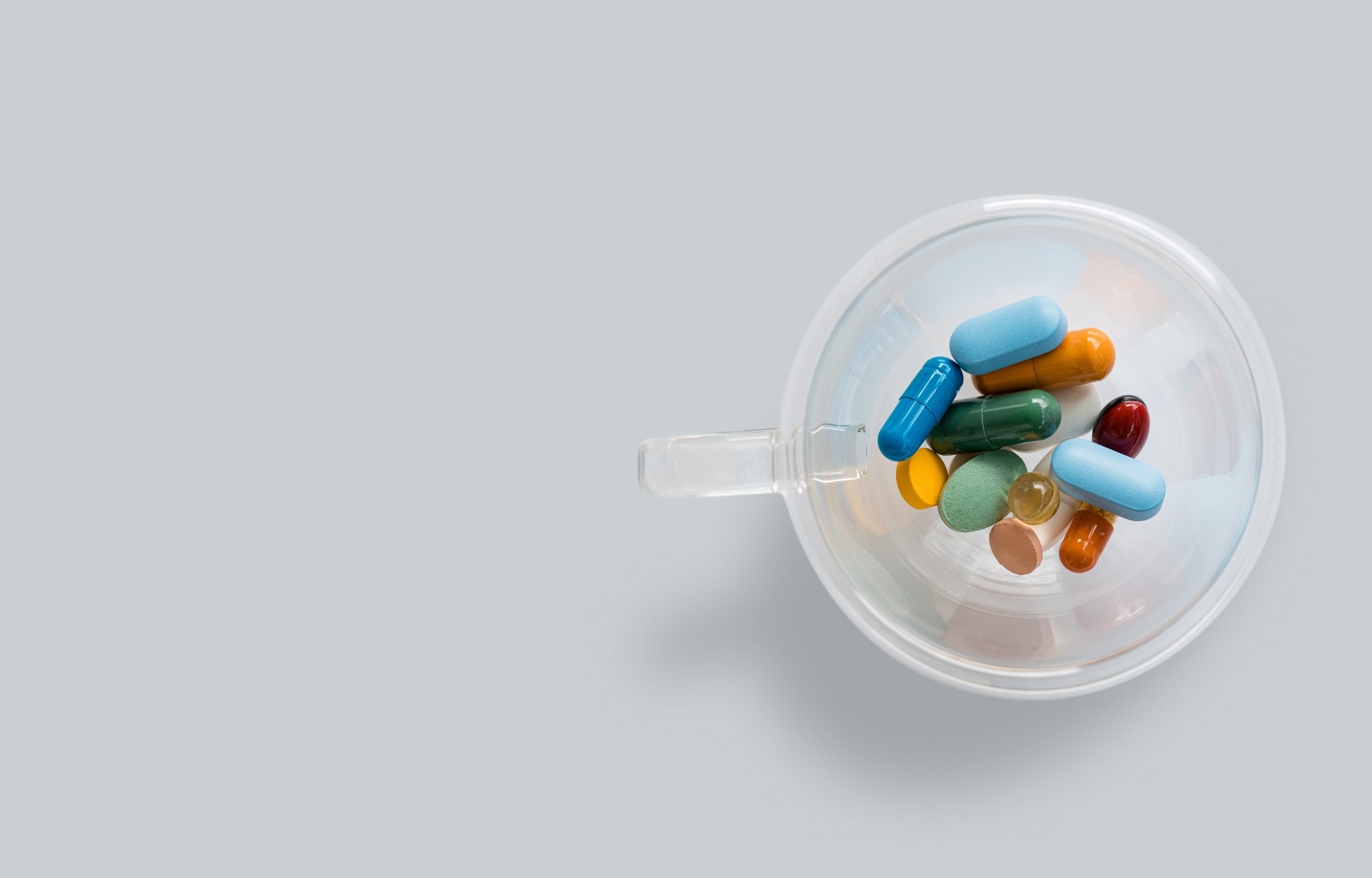
Nội dung bài viết / Table of Contents
Vitamin C is widely used for boosting the immune system and treating the common cold. Over the years, the demand for vitamin C supplements has been increasing, especially during this pandemic. Perishable products that brand themselves as a source of vitamin C are also flooding the market. Along with that, self-care products often claim on the labels that vitamin C benefits include everything from tone evening, anti-aging, skin smoothing, and many more!

Credit: Diana Polekhina on Unsplash
But is vitamin C really that magical, or is it just another overhyped ingredient? This article will spell out the myths and facts surrounding this popular vitamin.
Vitamin C, also known as ascorbic acid, is an essential micronutrient for our body. It is a water-soluble vitamin that humans could not produce endogenously, which means that we must obtain it daily from external sources like food and dietary supplements for optimal health. It has biosynthetic and antioxidant properties that play an important role in our bodily functions. Vitamin C can also be found in self-care products, but their benefits only reach skin deep and do not contribute to our daily nutrition intake.
There is no doubt that vitamin C has loads of benefits. But, here are significant functions of vitamin C for our bodies:
In addition, there is still ongoing research examining the potentials of vitamin C in preventing certain types of cancer and cardiovascular diseases. It is hypothesized that by limiting the damaging effects of free radicals through its antioxidant activity, vitamin C aids in the prevention of diseases where oxidative stress plays a causal role.
On skincare and other cosmeceutical self-care products, vitamin C is often associated with various claims. Some of the most prevalent ones are anti-aging, brightening, and texture enhancement. Other than its known role on collagen production which keeps our skin firm, studies show that vitamin C also has the ability to shield our skin from environmental stressors. It reduces exposure to free radicals that play a role in accelerated skin aging.
Vitamin C also works hand in hand with sunscreen as it would add an additional layer of protection against UV damage if applied before SPF. Research has shown, too, that vitamin C works well for skin-brightening, evening out skin tone, and treating hyperpigmentation due to its ability to interfere with pigment production.

Credit: nrd on Unsplash
Fresh fruits and vegetables are the greatest sources of vitamin C, and we are lucky that things containing vitamin C are very abundantly provided by nature. Here is a list of fruits and veggies that can be easily found in your local supermarket, ranked from highest to lowest in vitamin C content.
| Food | Milligrams (mg) per serving | Percent (%) DV* |
| Red pepper, sweet, raw, ½ cup | 95 | 106 |
| Orange juice, ¾ cup | 93 | 103 |
| Orange, 1 medium | 70 | 78 |
| Grapefruit juice, ¾ cup | 70 | 78 |
| Kiwifruit, 1 medium | 64 | 71 |
| Green pepper, sweet, raw, ½ cup | 60 | 67 |
| Broccoli, cooked, ½ cup | 51 | 57 |
| Strawberries, fresh, sliced, ½ cup | 49 | 54 |
| Brussels sprouts, cooked, ½ cup | 48 | 53 |
| Grapefruit, ½ medium | 39 | 43 |
| Broccoli, raw, ½ cup | 39 | 43 |
| Tomato juice, ¾ cup | 33 | 37 |
| Cantaloupe, ½ cup | 29 | 32 |
| Cabbage, cooked, ½ cup | 28 | 31 |
| Cauliflower, raw, ½ cup | 26 | 29 |
| Potato, baked, 1 medium | 17 | 19 |
| Tomato, raw, 1 medium | 17 | 19 |
| Spinach, cooked, ½ cup | 9 | 10 |
| Green peas, frozen, cooked, ½ cup | 8 | 9 |
Courtesy of NIH
*DV = Daily Value, based on 90 mg recommended daily intake for adults and children aged 4 years and older.
For a more comprehensive list of foods containing vitamin C, click here.
Sources of vitamin C can also be found in many consumer products such as juice boxes, energy drinks, and fizzy refreshments. That are often excessively rich in vitamin C, containing up to 1000 mg or 11x of the recommended daily value! Those brands often encourage consumers to drink as much as 1-2 bottles a day, painting the products as healthy and “necessary.” However, it is often not the case as too much vitamin C intake could lead to adverse consequences as explained in the “Intake & Safety Recommendations” section below.

Credit: Mathilde Langevin on Unsplash
As for self-care products, vitamin C is usually formulated as an active ingredient in serums, body lotions, and face moisturizer. They are commonly in the form of L-Ascorbic Acid which can be found on the ingredient list. Additionally, there are also things like face masks, micellar water, face washes, and many other wash-off products that claim to contain vitamin C , yet they are usually gimmicky. Vitamin C works best on leave-on products: they need time to do their magic!
The most potent concentrations can usually be found in serums, ranging from as low as 5% to as high as 20%. Lower concentrations deliver mild results with minimum risk of irritation. As the percentage goes up, both the potency and risk of irritation goes up as well. For most people, the sweet spot is usually between 10-15%. Going over 20% does not increase the efficacy but may bring unnecessary irritation instead. People with sensitive skin who are interested in incorporating vitamin C into their skincare routine, should start with lower concentrations and increase as tolerated to reap the benefits without risking irritation. Either morning or night, you should only apply once a day. It’s recommended to apply right after washing your face because it most likely has the lowest pH compared to the rest of your products!
Vitamin C works hand in hand with sunscreen as it adds an additional layer of protection against the UV rays. Therefore, using them in the morning skincare regimen makes most sense. They should be applied first thing after washing your face, before moisturizer and sunscreen.
Nevertheless, vitamin C serums are often unstable and can oxidize when exposed to sunlight, air, and excessive heat; making them lose their potency. Thus, you should go for vitamin C serums that come in either amber bottles or airless pump packaging. Choosing a product that also contains Ferulic Acid (vitamin E) helps too, since it can help stabilize the formula while also providing an even better photoprotection.

Credit: Adam Nieścioruk on Unsplash
There are many dietary supplements containing vitamin C on the market. They are usually sold in the form of multivitamin pills, chewy gummy bears, immune-boosting shots, powders, and many more. The daily recommended vitamin C intake for people in general is 90 mg (adults and children older than 4 y.o.), with a safe maximum cap at 2000 mg. However, there are more specific ranges of toleration as shown in the table below.
| Age | Male | Female | Pregnancy | Lactation |
| 0–12 months | Not possible to establish* | Not possible to establish* | ||
| 1–3 years | 400 mg | 400 mg | ||
| 4–8 years | 650 mg | 650 mg | ||
| 9–13 years | 1,200 mg | 1,200 mg | ||
| 14–18 years | 1,800 mg | 1,800 mg | 1,800 mg | 1,800 mg |
| 19+ years | 2,000 mg | 2,000 mg | 2,000 mg | 2,000 mg |
*Formula and food should be the only sources of vitamin C for infants. Courtesy of NIH
Consuming more than the recommended daily intake, or even worse, above the safe limit, would not bring any more benefits to our body. The excess vitamin C unused in our bodily functions would just be excreted through urine. Hence, there is no point in consuming vitamin C (or other micronutrients) in copious amounts.
Continuous excessive consumption of vitamin C over prolonged periods of time could lead to diarrhea, nausea, heartburn, and increase your risk of developing kidney stones. Unless you are deficient or recommended by your medical provider, consuming vitamin C through dietary supplements is commonly unnecessary since you can easily reach your daily intake goal through fruits and vegetables.
According to the NIH, vitamin C inadequacy can occur in some groups of people. Vitamin C inadequacy can occur with intakes that fall below the Recommended Daily Amount (RDA) but are above the amount required to prevent overt deficiency (approximately 10 mg/day). The following* groups are more likely than others to be at risk of obtaining insufficient amounts of vitamin C.
Smokers and passive “smokers”
Studies consistently show that smokers have lower plasma and leukocyte vitamin C levels than nonsmokers, due in part to increased oxidative stress. For this reason, it is concluded that smokers need 35 mg more vitamin C per day than nonsmokers. Exposure to secondhand smoke also decreases vitamin C levels. Although a specific vitamin C requirement for nonsmokers who are regularly exposed to secondhand smoke is currently undetermined, these individuals should ensure that they meet the RDA for vitamin C.
Infants fed evaporated or boiled milk
Generally, infants are fed breast milk and/or infant formula, both of which supply adequate amounts of vitamin C. For many reasons, feeding infants with evaporated or boiled cow’s milk is not recommended. This practice can cause vitamin C deficiency because cow’s milk naturally has very little vitamin C and heat can destroy vitamin C.
Individuals with limited food variety
Although fruits and vegetables are the best sources of vitamin C, many of them have small amounts of this nutrient. Thus, through a varied diet, most people should be able to meet the vitamin C RDA or at least obtain enough to prevent scurvy. People who have limited food variety—including indigent individuals who prepare their own food; people who abuse alcohol or drugs; people with mental illness; and, occasionally, children—might not obtain sufficient vitamin C.
People with malabsorption and certain chronic diseases
Some medical conditions can reduce the absorption of vitamin C and/or increase the amount needed by the body. People with severe intestinal malabsorption or cachexia and some cancer patients might be at increased risk of vitamin C inadequacy. Low vitamin C concentrations can also occur in patients with end-stage renal disease on chronic hemodialysis.
* This list is courtesy of the NIH
Cherney, K. (2019, January 29). Ferulic Acid: Anti-Aging Benefits for Skin. Healthline. https://www.healthline.com/health/ferulic-acid.
Hoshikawa, K., & Fasanella, K. (2021, May 18). The 21 Best Vitamin C Skin-Care Products for Brighter Skin. Allure. https://www.allure.com/gallery/get-brighter-skin-vitamin-c.
Odacité. (n.d.). What Are Free Radicals? And How Do They Affect Your Skin? Odacité. https://odacite.com/blogs/tohealthandbeauty/what-are-free-radicals-and-how-do-they-affect-your-skin.
Paula’s Choice. (2020, February 25). What is Vitamin C and How Does it Benefit Skin?: Paula’s Choice. Shop Paula’s Choice. https://www.paulaschoice.com/skin-care-advice/skin-brightening/what-is-vitamin-c-and-how-does-it-benefit-skin.
RxList. (2021, March 29). Medical Definition of Vitamin C. RxList. https://www.rxlist.com/vitamin_c/definition.htm.
S, D. D. D. S. F. H. P. (1996, July). Effectiveness of antioxidants (vitamin C and E) with and without sunscreens as topical photoprotectants. Acta dermato-venereologica. https://pubmed.ncbi.nlm.nih.gov/8869680/.
Shaikh, J. (2021). What are the characteristics of an effective vitamin C serum? MedicineNet. https://www.medicinenet.com/what_is_the_most_effective_vitamin_c_serum/article.htm.
U.S. Department of Health and Human Services. (n.d.). Office of Dietary Supplements – Vitamin C. NIH Office of Dietary Supplements. https://ods.od.nih.gov/factsheets/VitaminC-HealthProfessional/.
Villett, M. (2018, August 21). The Reason Vitamin C Serum Can Darken Your Skin (And How to Stop It from Happening). The Skincare Edit. https://theskincareedit.com/2018/08/21/vitamin-c-serum-darkens-skin.